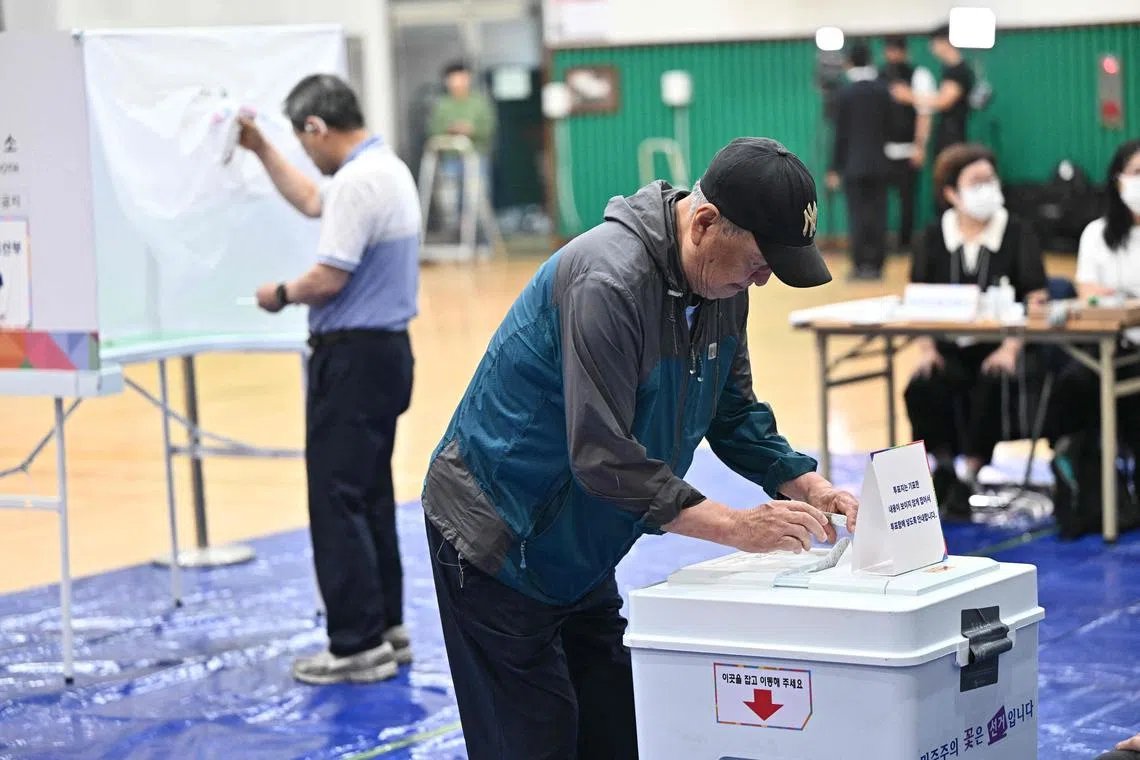South Korea votes for new president after martial law turmoil
Sign up now: Get insights on Asia's fast-moving developments

A man casting his vote at a polling station in Seoul during the presidential election on June 3.
PHOTO: AFP
Follow topic:
SEOUL - South Koreans flocked to the polls on June 3 to elect a new president, six months to the day that former leader Yoon Suk Yeol plunged the country into political chaos with his disastrous declaration of martial law.
After months of turmoil and a revolving door of lame-duck acting leaders, many South Koreans are eager for the country to move forward.
All major polls have put liberal Lee Jae-myung well ahead, with the latest Gallup survey showing 49 per cent of respondents viewed him as the best candidate.
Mr Kim Moon-soo from the conservative PPP has trailed Lee in the polls, with 35 per cent in the survey.
Whoever emerges victorious will take office almost immediately and faces a bulging in-tray, including global trade vicissitudes chafing the export-driven economy, some of the world’s lowest birth rates and an emboldened North Korea rapidly expanding its military arsenal.
The fallout from martial law, which has left South Korea effectively leaderless for the first months of US President Donald Trump’s second term, is the top concern for voters, experts said.
Voter Park Dong-shin, 79, told AFP he was voting “to make a new country once again”.
Yoon’s martial law declaration “was the kind of thing done during the old days of dictatorship in our country”, he said.
He was voting for the candidate who would make sure those responsible were “properly dealt with”.
Millions have already cast their ballots
‘Strength of the people’
A handful of elderly voters lined up at a polling station in Seoul’s Munrae-dong area at 6am to cast their ballots when voting began.
“We were the first to arrive with the hope our candidate gets elected,” Madam Yu Bun-dol, 80, told AFP, adding she was voting for the PPP – Yoon’s former party.
Overall voter turnout is expected to be high.
Seoul’s National Election Commission said as of midday, a total of 62.1 per cent of eligible voters had cast their ballots, including early and overseas voters – up from 61.3 per cent at the same point in the previous election.
Campaigning is not allowed on election day, but Lee posted on Facebook that the vote would “show the strength of the Korean people”, after months of turmoil.
Dr Kang Joo-hyun, a political science professor at Sookmyung Women’s University, told AFP: “Polls show the election is viewed largely as a referendum on the previous administration.
“The martial law and impeachment crisis not only swayed moderates, but also fractured the conservative base.”
Yoon’s impeachment
Conservative candidate Mr Kim also failed to convince a third party candidate, Mr Lee Jun-seok of the Reform Party, to unify and avoid splitting the right-wing vote.
‘Turning point’
Exit polls by South Korea’s major broadcasters will be released around 8pm – immediately after polls close – and are expected to give a fairly accurate picture of who won.
In the 2022 presidential election, they predicted the outcome accurately down to the first decimal place.
Seoul’s streets were peaceful as people made the most of good weather and a public holiday, but police issued the highest level of alert and deployed thousands of officers to ensure the poll proceeded smoothly.
Liberal candidate Lee – who survived an assassination attempt last year – has been campaigning in a bullet-proof vest and delivering speeches behind a glass protective shield.
Ex-leader Yoon and his wife Kim Keon Hee cast their ballots at a polling station near their residence, but did not respond to questions from journalists.
South Korean presidents serve a single five-year term.
With a regular presidential election, there is a months-long transition period, and the new leader’s term begins at midnight after the predecessor’s final day.
But in a snap election, the winner becomes president as soon as the National Election Commission ratifies the vote tally.
Taxi driver Choi Sung-wook, 68, said he was voting for liberal Lee, partly due to his impoverished childhood, which he believed “will have a big influence on how he will serve the people”.
“I thought Yoon would do well, but he betrayed the people. I hope the next president will create an atmosphere of peace and unity, rather than ideological warfare.”
Mr Bae Kang-hoon, co-founder of political think-tank Valid, said: “The focus won’t be on whether Lee will win, but on whether he will secure more than 50 per cent of the vote.
“If he manages to do so, it would give him a significant boost in momentum to govern as president.” AFP

